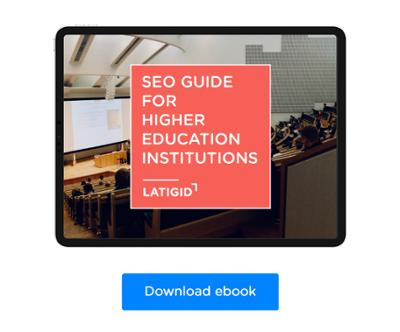
Inbound marketing for universities is key when it comes to attracting, engaging and converting students. Traditional outbound marketing methods are losing their effectiveness, making it imperative for universities to embrace a more customer-centric approach. This is where inbound marketing comes into play.
In this blog article, we will explore the dynamic world of inbound marketing and how it can revolutionize the recruitment efforts of universities. From optimizing website content and leveraging social media to nurturing leads and personalizing communication, we will delve into the powerful tactics that universities can employ to stand out in the digital realm.
Core principles and benefits of inbound marketing
Inbound marketing is an effective approach for universities to attract, engage, and retain prospective students, alumni, and other stakeholders. It focuses on creating valuable content and experiences that align with the interests and needs of the target audience. Here are some core principles and benefits of inbound marketing for universities:
Audience-centric approach
Inbound marketing centers around understanding the target audience and creating content tailored to their interests, challenges, and aspirations. By adopting an audience-centric approach, universities can deliver relevant and meaningful content that resonates with their prospective students.
Content creation
Inbound marketing emphasizes the creation of high-quality content, such as blog posts, videos, eBooks, and webinars, that provides value to the audience. Universities can develop educational content that showcases their expertise, highlights campus life, shares student success stories, and offers helpful resources to attract and engage potential students.
Lead generation and nurturing
By producing valuable content, universities can attract potential students and capture their information through forms, newsletter subscriptions, or gated content. This helps universities build a database of leads for ongoing engagement. Through personalized email marketing campaigns and nurturing workflows, universities can establish relationships, answer questions, and guide prospective students throughout their decision-making process.
Search engine optimization (SEO)
Inbound marketing strategies include optimizing web content and employing SEO best practices to improve a university's visibility in search engine results. By incorporating relevant keywords, creating compelling meta descriptions, and building backlinks, universities can enhance their online presence and increase organic traffic to their website.
Social media engagement
Inbound marketing encourages universities to leverage social media platforms to connect with their target audience. By actively engaging in conversations, sharing content, and participating in relevant communities, universities can build brand awareness, attract prospective students, and foster a sense of community among current students and alumni.
Relationship building and brand loyalty
Inbound marketing focuses on nurturing long-term relationships with students and alumni, extending beyond the initial recruitment phase. By providing ongoing value, universities can strengthen their bond with the community, cultivate brand loyalty, and encourage advocacy among their students and alumni.
Data-driven decision-making
Inbound marketing relies on data and analytics to measure the effectiveness of various strategies and campaigns. Universities can track website traffic, conversion rates, email open rates, and other key performance indicators (KPIs) to gain insights into the success of their marketing efforts. This data-driven approach enables universities to make informed decisions, refine their strategies, and allocate resources effectively.
Inbound marketing offers several benefits for universities. Here are some key advantages:
Cost-effectiveness
Inbound marketing typically requires lower financial investments compared to traditional marketing methods like print advertising or direct mail campaigns. By creating and distributing content online, universities can reach a broader audience at a fraction of the cost, making it a cost-effective marketing approach.
Increased brand awareness
Inbound marketing helps universities build brand awareness among their target audience. By consistently producing valuable content and optimizing it for search engines, universities can increase their visibility in search results, social media platforms, and other online channels. This exposure helps potential students become aware of the university and its offerings.
Targeted and qualified leads
Inbound marketing enables universities to attract highly targeted leads who have already expressed interest in their content or offerings. By creating content specifically tailored to the needs and interests of their target audience, universities can attract individuals who are more likely to be interested in their programs and services. This leads to higher-quality leads and improved conversion rates.
Enhanced student engagement
Inbound marketing provides universities with the opportunity to engage with prospective students, current students, and alumni on various digital platforms. By creating valuable and interactive content, universities can foster meaningful relationships with their audience. Engaged students are more likely to stay connected with the university, participate in events, and become loyal brand advocates.
Data-driven decision-making
Inbound marketing allows universities to track and measure various metrics and key performance indicators (KPIs). Through analytics tools, universities can gain insights into their website traffic, content performance, lead generation, and conversion rates. This data helps in making informed decisions about marketing strategies, content optimization, and resource allocation.
Improved student recruitment and retention
Inbound marketing strategies help universities attract the right students who align with their values and offerings. By providing valuable content and personalized experiences, universities can showcase their unique selling propositions and differentiate themselves from competitors. This targeted approach improves the likelihood of attracting students who are more likely to thrive and succeed at the university, leading to better student recruitment and retention rates.
Cultivation of brand advocates
Inbound marketing nurtures relationships with students and alumni, fostering a sense of loyalty and advocacy. When students have a positive experience with a university and feel supported throughout their educational journey, they are more likely to become brand advocates. These advocates can play a crucial role in promoting the university through word-of-mouth, social media, and online reviews, contributing to increased brand reputation and credibility.
Overall, inbound marketing provides universities with a strategic and cost-effective approach to reach and engage their target audience, generate high-quality leads, and build long-lasting relationships with students and alumni.
Related article: Inbound Marketing for Higher Education: Student Retention Tips
10 Inbound Marketing Tactics for Universities
Here are ten inbound marketing tactics that universities can implement to attract, engage, and retain students:
Content Marketing
Create and distribute valuable and educational content that addresses the interests and needs of prospective students. This can include blog posts, videos, podcasts, eBooks, and infographics related to campus life, career advice, program highlights, and student testimonials.
Search Engine Optimization (SEO)
Optimize website content with relevant keywords, meta tags, and descriptions to improve organic visibility in search engine results. Conduct keyword research to understand the terms prospective students use when searching for educational opportunities.
Social Media Engagement
Maintain an active presence on social media platforms like Facebook, Instagram, Twitter, and LinkedIn. Share engaging content, respond to inquiries, participate in discussions, and build a sense of community among current students, prospective students, and alumni.
Email Marketing
Build an email subscriber list and send targeted newsletters and campaigns to nurture leads and maintain relationships with prospective students. Personalize emails based on the recipient's interests and stage in the enrollment process.
Webinars and Virtual Events
Host webinars, online open houses, and virtual campus tours to provide an immersive experience for prospective students. This allows them to interact with faculty, staff, and current students, ask questions, and gain insights into the university's offerings.
Student Success Stories
Showcase the achievements and success stories of current and past students. This helps prospective students envision themselves succeeding at the university and establishes credibility and social proof.
User-Generated Content
Encourage current students and alumni to share their experiences, testimonials, and content related to their time at the university. This can be in the form of blog posts, social media posts, videos, or podcasts.
Influencer Marketing
Collaborate with influential individuals within the education sector, such as professors, industry experts, or alumni, who can promote the university and its programs. Their endorsement can attract the attention of prospective students and build trust.
Chatbots and Live Chat
Implement chatbot systems or live chat functionality on the university's website to provide instant support and answer frequently asked questions. This improves the user experience and helps address inquiries promptly.
Alumni Engagement
Maintain a strong connection with alumni by organizing alumni events, networking opportunities, and online communities. Engaged alumni can become ambassadors and advocates for the university, contributing to its reputation and attracting prospective students.
These tactics can help universities establish a strong online presence, engage prospective students, and foster lasting relationships with their community. Remember to monitor and analyze the results of each tactic to refine and optimize your inbound marketing strategies over time.
Related article: Inbound Marketing for Universities: How to Attract New Students
About LATIGID
We are a Higher Education Marketing Agency, specializing in Inbound Marketing. We help you grow by increasing website traffic, generating more student leads, and closing those leads into enrollment. With a deep understanding of the latest industry trends and best practices, we are well equipped to help your institution grow.
If you are looking for a Higher Education Marketing Agency to partner with, check our page to see what we can do for you!
Download our SEO guide and learn how to build a strategy to optimize your Higher Education Institution's website




